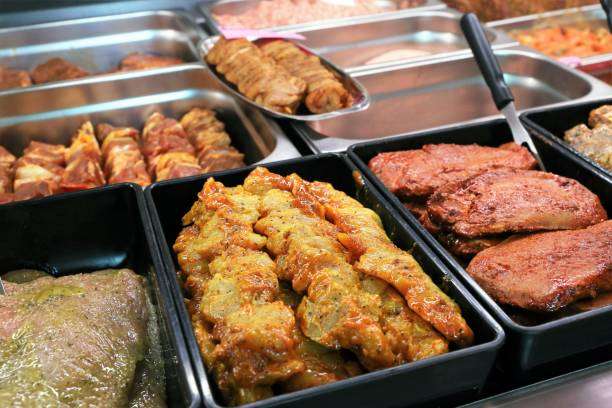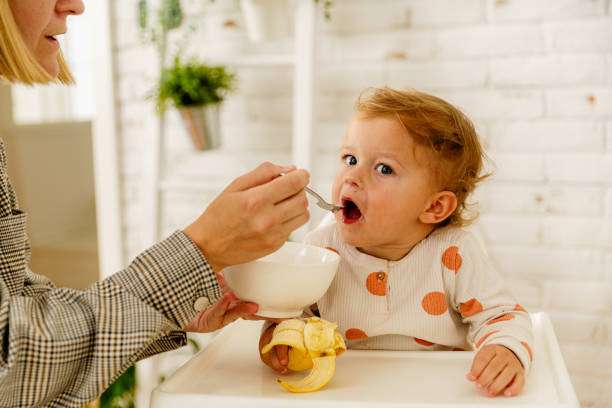
What Every Parent Should Know
As parents, one of the most significant choices we make is regarding the best foods for our babies that we consider healthy and safe. Organic baby food is the same as maybe taking antibiotics with the assurance of using natural ingredients and giving a safer start for children. But are they really that good? This write-up provides parents with the whys and wherefores of choosing organic baby food from the benefits through the ingredients to homemade recipes and handy tips.
Introduction
Why Choose Organic Baby Food?
When thinking of organic baby food, safety and nutrition obviously come before other preconditions in creating a future for the child by saying goodbye to conventional . For that reason, organic infant foods expose infants to a near-specific minimum of the detrimental pesticides, synthetic fertilizers, and GMOs. Infants are more susceptible to these chemicals, and such organic foods could help assuage parental concerns about risk, as their bodily systems are still developing at that age.
Apart from synthetic and artificial preservatives, dyes, and flavors, organic baby foods tend to contain nothing but pure whole-grain in unprocessed forms as close to the natural composition as possible. Some research indicates that certain organic fruits may boast super high levels of antioxidants that help bolster the immune system and represent essential early development nutrients. uses sustainable farming practices that benefit our planet by enriching soils, conserving water, and minimizing pollution.
However, favorable consideration for such appears wholly consistent with an existing philosophy not just advocating for the infant’s health, but also concerned with that of the earth itself. To go organic is to allow parents the opportunity to start modeling for their children ways in which such a choice inspires a lifetime of healthy and positive eating habits.
Safety, nutrition, and purity-first-caring about those is critical when providing meals for little ones. thus provides for a purer alternative-in that its ingredients are grown without synthetic pesticides, fertilizers, or GMOs and no artificial additives. Many parents opt for by reasoning it is safer and better for their child’s health. This guide will thus help you to know precisely how organic baby food is unique and how to make a wise decision, hoping that you’ll align with what you feel for you and all.
Understanding Organic Baby Food
Organic baby food refers to food made from ingredients grown and processed without synthetic pesticides, herbicides, GMOs, or artificial additives. For baby food to be labeled organic, it has to adhere to strict guidelines, often regulated by other certifications, such as USDA Organic. A better understanding of what goes into organic baby food-and what doesn’t-can reassure parents in the respect of their very intent: the safety of their baby’s meals.
The health benefits of organic
Reduced exposure to harmful chemicals: Babies are far more vulnerable to the harmful effects of chemicals. reduces possible exposure to potentially harmful pesticides and additives.
Higher nutrient quality in some foodstuff: Recent studies have suggested that some organic produce may be marginally richer in antioxidants and vital nutrients that will benefit the developmental bodies of their infants.
Absolutely no artificial ingredients: Organic guidelines do not allow for the use of synthetic colors, flavors, or preservatives, thereby providing pure and natural food options.
Supports sustainable agriculture: When you buy organic, you are supporting environmentally sound farming choices that mitigate the pollution and support biodiversity.
Key differences between organic and conventional baby food are some farming practices and ingredient quality. A quick run-down then will follow:
Pesticides: Organic food should have minimal to no synthetic pesticide residues on it.
GMOs: Organic baby food should be non-GMOs, conventional baby food may contain genetically modified ingredients.
Animal Products: If meat or dairy is used, organic products will come from animals raised without antibiotics or growth hormones.
Additives: Organic baby food shall be free from artificial preservatives, colors, or flavors.
Table of Contents
Essential Nutrition in Organic Baby Food
Fostering Proper Body Growth
Organic baby food should adequately fulfill the needs of the body during its developmental stage. Such baby food is loaded with:
Vitamins and Minerals: Organic fruits and vegetables with vitamins A and C together with minerals such as iron and calcium may be found amongst organic baby .
Good Fat: Organic containing foods such as avocado, olive oils, and dairy are helpful for grey matter development.
Protein and Fiber: Many organic grains, legumes, and proteins are fiber- and protein-rich and thus supportive of digestive health and growth.
Simple Steps to Selecting the Right Organic Baby Brands
There are so many brands available that it could be a tough job trying to choose one. Here are some keys:
Look for Certifications: To ensure the com
This ease to get you started
delicious and simple recipes for homemade organic baby .
Homemade organic baby foods can be economic, fun, and personal. Here are two simple nutritious recipes:
Organic Carrot and Apple Puree
Ingredients: 1 organic carrot and 1 organic apple
Peel and chop. Steam until soft then puree.
Organic Avocado and Banana Mash
Ingredients: 1 organic avocado, 1 ripe organic banana
Mash together well and serve immediately for a soft, nourishing meal.
Organic Baby Food Safety Tips for Parents
Organic baby food is generally quite safe, but extra safety tips may apply.
Check the expiration date. Organic foods tend to go stale quickly because of the absence of preservatives.
Storage. Store in an airtight glass container and refrigerate immediately after preparation.
Allergens. Introduce new foods one at a time, watching for any allergic symptoms they may show afterward.
Cleaning your workspace. While making homemade baby , be sure to always keep hands and utensils clean to protect against contamination.

Is organic baby food expensive: is it worth it?
This makes organic baby food highly-priced, because of the more caring farming practices made in the orders of production. Organic baby food is thus assumed by parents to be worth the extra money, given all the benefits and peace of mind it gives. For parents still fretting about visible expense, some options include this: homemade organic baby is again not all that hard to produce or sticking to the home-grown organic products on the group of Dirty Dozen, which lists produce having higher levels of chemicals and pesticides.
Conclusion:
Informed Choices for Your Baby’s Health
Choosing suitable for a baby is largely based on one’s own values and individual circumstances, as well as material constraints. Thus organic baby may assure lower levels of synthetic chemical contaminants, reduced artificial additives, and provide the advantage of a nutrient-dense diet, thereby possibly benefiting healthy growth and development.
Regardless of whether you want to go all-organic or do a mix of organic with conventionally grown products, it should always come back to ensuring your baby eats well with a lot of whole and nutritious to suit. Remember every healthy choice you make is toward laying the foundation for your baby always to be healthy and a good eater for life.
Feeding your baby is in itself a way towards a thoughtful, inquisitive, and loving parenthood. It is unquestionable that brings some major peace of mind to parents. may furnish a cleaner start for your precious little one due to its reduced exposure to synthetic chemicals, pesticides, and GMOs. Support from environmentally sound, organic farming practices also provides protection for soil quality, utilizes water wisely, and cuts down on pollution, ensuring a healthier planet for future generations.
The decision to go organic should not just be about having safer, cleaner ingredients in the baby food you’re preparing; it should represent an entire food philosophy that favors quality over convenience and opts for nature in lieu of synthetic alternatives. These choices set the tone for your child’s further foraging and enjoyment of natural flavors, textures, and aromas. It is worthy to note that some studies demonstrate organic baby food-to-have levels of antioxidants and fats superior to non-organic; but, bear in mind, that it is variety, balancing, and fresh ingredients that an optimal diet should strive for.
Nevertheless, the choice to go for should also consider practicalities such as budget and accessibility for some families that prefer them. It is also worth noting that organic baby food is usually costly on account of the labor-intensive farming techniques involved with stricter regulations. For some families, an exclusively organic diet is thus untenable-but that is human.
Striking the right balance of providing organic options for the items on the Dirty Dozen list (those with higher pesticide levels) while choosing high-quality conventional options for the others is the way out. And once again, keep in mind that a solid base for a baby’s health is predicated on providing a diet that nourishes the infant at each stage of their growth and development, rather than the question of organic and non-organic.
Creating organic baby at home can provide you with a varied and reasonably priced way of ensuring that your child has the best nutrition. Not only will this help you to control the quality and variety of ingredients you use, but it will give you the chance to instill in your baby a taste for natural flavors-without added sugars, salts, or preservatives that abound in pre-packaged foods. That can also make for a unique bonding experience in that you are doing something for your baby’s health and overall well-being.
Most importantly, whatever foods you can afford to give your baby-a balanced, nutritious meal-will count whatever the sources may be, that is- organic or otherwise. The love, care, and thoughtful choices you put into feeding your baby will contribute toward their health and further a great foundation for positive eating habits throughout their lifetime. Experiment with food choices with your babies in mind, allowing for change along the way depending on the baby’s reactions and preferences.

At the end of the day, every child is different; thus, feeding choices will always be child-dependent, both just like families. Enjoy the journey, be confident and flexible, knowing, in your heart, that the choices you make-including informed decisions backed by research-are giving your baby a good start toward a long, strong, healthy life. If you pick all organic, partially organic, or a balanced, practical approach, each meal provides some assistance toward offering the tiniest fantastic life support there is: growth, health, and hapless such.

Pingback: Best Food Near Me 2024